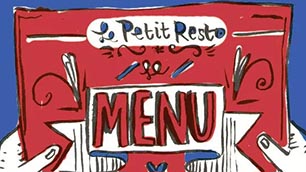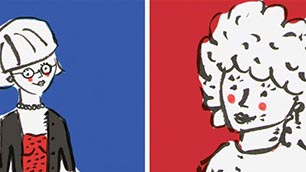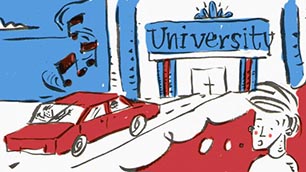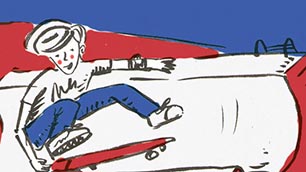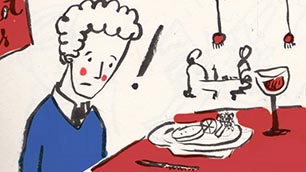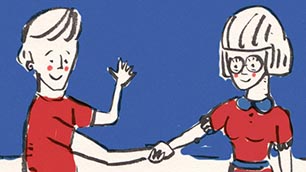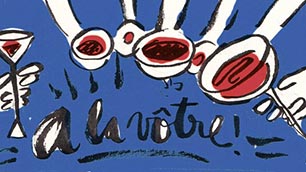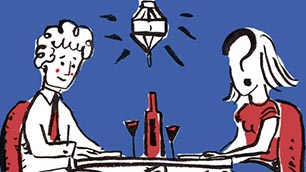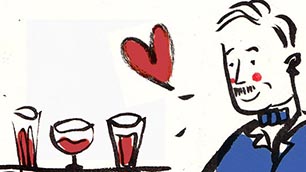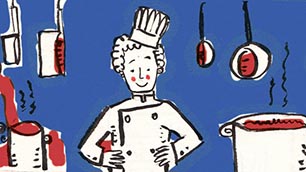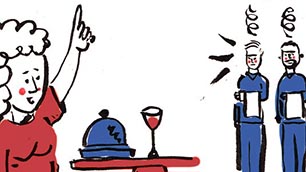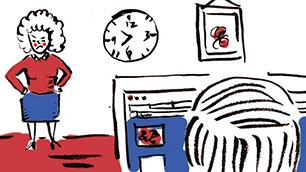| Valérie: | Now, we move to a new segment – French expressions. If you want to speak as French do, Jacques, you have to use French expressions. |
| Jack: | I know! |
| Valérie: | Lots of them! |
| Jack: | I know, I know. I have spent a few months in Paris learning French cuisine and working on my restaurant idea. I know how frequently French people use them. It’s like in my neighborhood, in Brooklyn, NY, where I grew up. I swear, we could throw out all the words and get away only with expressions! |
| Valérie: | Get outta here! |
| Jack: | Yeah, yeah! This is it. That’s one of them! |
| Valérie: | Well, let’s get started then! The first French expression we’ll learn is Ah bon ? |
| Jack: | Ah bon ? |
| Valérie: | Oui, Ah bon ? is most of the time translated ‘really?’ but it can be translated into many other ways in English. Generally, we use it to express surprise but also to acknowledge what someone just said. In this case, it won’t really sound like a question... just like ‘really’... It isn’t always a question; sometimes, it just means ‘I see.’ If you go to France, you’ll hear it a lot. Well, now that we’ve gone over the grammar lesson and the vocabulary words, do you think you could try to incorporate some of that to explain your restaurant idea? |
| Jack: | I’m not sure. Je suis not ready. |
| Valérie: | Je ne suis pas prêt, that’s how you would say I’m not ready. |
| Jack: | Ah bon ? |
| Valérie: | Don't be shy! Just go with your story. Whatever you can say in French, say it in French. Switch to English if you can't find words. Just don't stop. |
| Jack: | Well, let's try... Le restaurant est différent et original. |
| Valérie: | Très bien Jacques ! |
| Jack: | Couples would come on a first date and use the food, la cuisine, to tell about themselves. Le menu will feature items to help them do just that. For example... |
| Valérie: | Par exemple... |
| Jack: | Par exemple, si un client est prêt to settle down and get married, he can order a classic plat principal such as “roast beef et purée de pommes de terre fait maison”. |
| Valérie: | Ah bon ? Why would “roast beef et purée de pommes de terre fait maison” send the message that he is ready to settle down? |
| Jack: | Ah bon ? Isn’t that obvious? |
| Valérie: | Not to me? But, go on! Je suis... euh... hooked ! |
| Jack: | Ah bon ? No, I mean, really? |
| Valérie: | Oui, oui ! It’s a …an unorthodox idea! Je suis hooked, and je suis intrigued. Well, let me ask you this. If une cliente wants to warn her date that she likes le luxe, what could she order? |
| Jack: | Hmmm, in this case, “Caviar russe et blinis” est un bon choice. |
| Valérie: | What if elle est temperamental ? |
| Jack: | Maybe un dessert “les truffes au chocolat amer”. |
| Valérie: | Wow! You have a real food conversation going on in your restaurant! |
| Jacques: | That’s the idea! It’s better than sitting and feeling awkward on your first date. |
| Valérie: | I agree. Let’s continue. Si elle est passionnée ? |
| Jack: | Passionate? She can commander “Mousse aux fruits de la passion”. Are you trying to describe someone in particular? Elle likes le luxe, elle est temperamental, elle est passionnée. Es-tu that client? |
| Valérie: | Non, non, Jacques ! Who pays l’addition in your restaurant? |
| Jack: | Le serveur or la serveuse can’t allow la cliente to pay l’addition. |
| Valérie: | Ah bon ? |
| Jack: | Je suis a little old-fashioned. |




